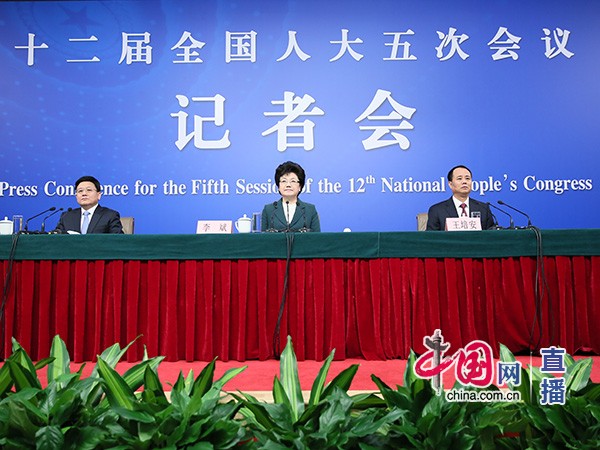A 2nd child: to bear or not to bear?
- By Guo Yiming
 0 Comment(s)
0 Comment(s) Print
Print E-mail China.org.cn, March 14, 2017
E-mail China.org.cn, March 14, 2017
 |
|
Officials from the National Health and Family Planning Commission address concerns from the public at a press conference on March 11. [Photo by Gao Cong/China.org.cn] |
Eligible couples are not all convinced about having a second baby, in spite of China's overall relaxation of a decades-long family planning policy last year.
Among 90 million eligible couples nation-wide, only 28 percent of them are willing to bear a second child due to various reasons, said Wang Pei'an, vice head of the National Health and Family Planning Commission (NHFPC), citing that women's career prospects, a shortage of facilities for child care as well as economic pressure are topping the list of their worries.
The easing of the one-child policy, which allows Chinese families to have two children, due to a shrinking labor force and a rapidly aging population, has push the number of births in the country to over 18.46 million.
"The policy has showed 'notable results' in 2016, leading to the largest annual number of newborns since 2000," a senior health official said during a press conference in Beijing at the height of the ongoing sessions of the top legislators.
The total fertility rate, though lower than expected, also rose to 1.7, compared to 1.5-1.6 between 2000 and 2015.
In response to the relatively low fertility rates, Cai Fang, vice head of the Chinese Academy of Social Sciences, said that there should be a shift in government policy from "allowing" couples to have a second child to "encouraging" them to echo the call.
Encouragement does not necessarily mean direct subsidies or allowances for couples, but government incentives accompanied by better public services like medical care, education and living conditions, he added.
The decades-old policy has certainly left a mark on Chinese society and people's lives. Since 1979, the Chinese government has been promoting the virtue of bearing only one kid that has been credited with helping foster China's surging economy by slowing population growth.
In this year's government work report, Premier Li Keqiang said that the country will strengthen the maternity medical and healthcare services, as the policy of allowing couples to have two children has been adopted.
Li Bin, head of the NHFPC, vows to boost maternal services, cultivation and training of medical staff, and to build a complete service chain for an extended family.
Official data shows that 1,000 babies share 0.43 pediatricians.
Most of China's current kindergartens only cater for kids above 3 years old; with infants and toddlers, aged 0 to 3, at risk of being unattended when their parents go to work.
Moreover, workplace gender discrimination against females, especially pregnant woman, also contributes to a low fertility rates among women.
Gu Jin, a doctor at Beijing Cancer Hospital and a NPC deputy, calls for more efforts to cultivate obstetricians and maternity assistants, and constantly enhance their expertise in the trade.
NPC member Sun Jing suggests that the country grant paid maternity leave to males in order to alleviate gender discrimination toward maternal mothers at workplace and prompt the male partner to shoulder more family responsibilities at home.
The government's 13th Five-Year Plan (2016-2020) pledges to boost public services, including mother and child care, education and social security to support two-child families.
"It is important for people to change their mindset, and respect women's employment rights as women and children are the future of our country," said Fu Ying, spokesperson for the National People's Congress.
"Relevant policies and services need to be upgraded, for example, the providing of adequate maternity checkups and childcare, to meet the new needs."
Moreover, in response to the rising cost of raising an extra baby, Finance Minister Xiao Jie said that the government is considering a tax deduction for two-child families.
"We're fairly optimistic about the policy's implementation and its future outlook," said Wang Pei'an. "NHFPC will pay special attention to population quality and demographic structure."
The country's population will peak to 1.45 billion by 2030 and drop to 1.1 billion towards the end of this century, he says, shrugging off concerns over a demographic crisis.






Go to Forum >>0 Comment(s)